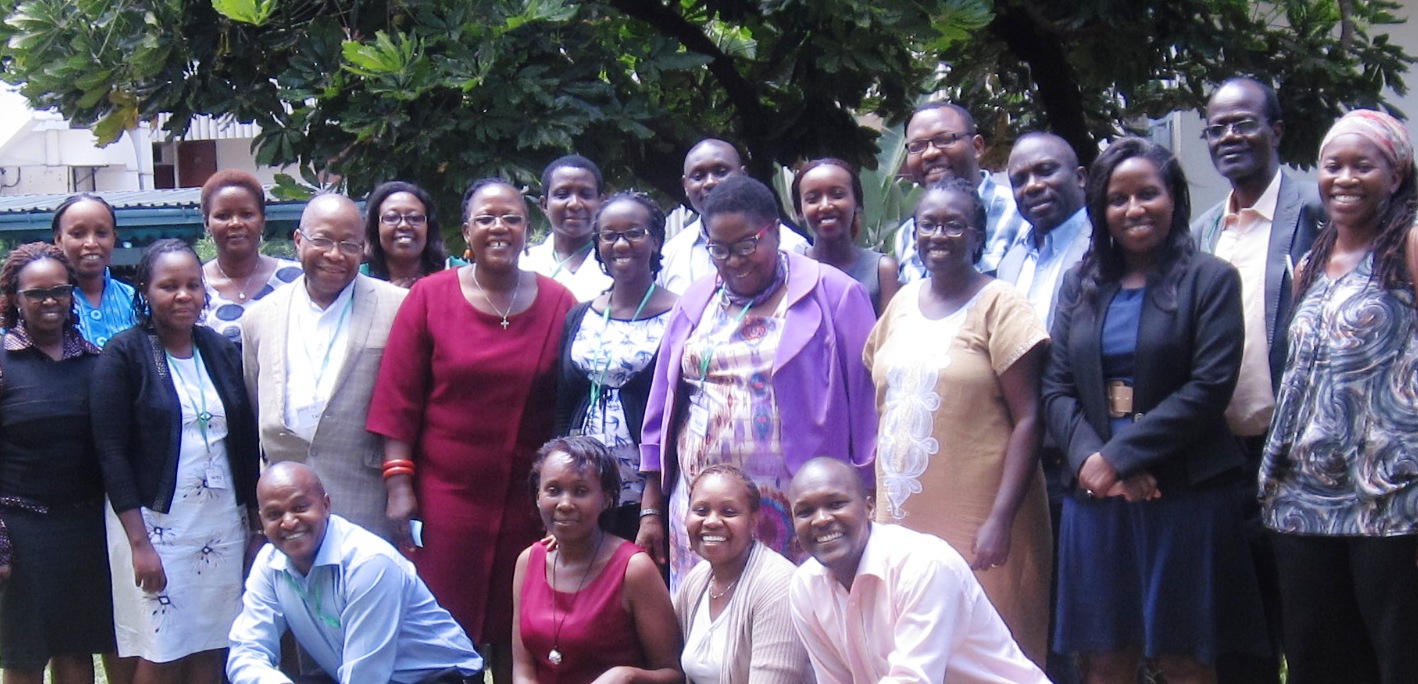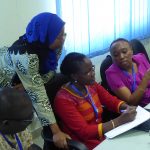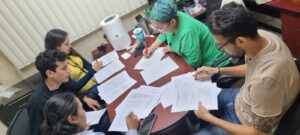
How are Higher Education institutions addressing gender issues?
AuthorAID sponsored gender sensitization workshop creates gender awareness in the work of PASGR staff and partners in Nairobi.
—————————————————————————————————————————–
– Blog post by Christine Laustsen, Programme Assistant, INASP
Women often face far more barriers in pursuing research and academic careers than their male counterparts. Constraining family expectations and balancing multiple roles as wives, mothers and researchers can negatively affect women’s academic career advancement. At institutional level barriers can often include policies that fail to address women’s needs, lack of senior female mentors, campus safety issues, and difficulty in breaking through the glass ceiling of promotion.
Over the last year INASP’s AuthorAID project has focused on supporting women in research to address gender inequality in academia. As part of this work we have awarded a total of 22 grants to support researchers to present gendered research at conferences or organize a gender workshop in their own institution.
Raising the visibility of gender sensitive research
The AuthorAID gender travel grants have enabled researchers from Ghana, Kenya, Nigeria, Palestine, Cameroon, India, Cambodia and Vietnam to travel to international conferences to present gendered research on a variety of topics. Our travel grants have supported researchers directly addressing gender inequalities in higher education as well as research on other topics with a strong focus on sex and gender differences.
Supporting researchers to raise the visibility of gender sensitive research is important in that it helps to ensure that research is inclusive and produces quality outcomes for men and women alike.
“It offered me the occasion to meet researchers, in the area, share ideas and obtain amazing contributions and new ideas on how to proceed with my PhD thesis. The conference was a revelation and the knowledge gained is not going to serve my personal career only but also my department.” – AuthorAID travel grant recipient
“Attending this conference offered me the opportunity not only to do a presentation but to also meet researchers in my area of interest…. My poster session was very engaging and fruitful as we discussed issues such as what specific gender differences occur with TB and whether gender affects treatment outcomes of patients. We also discussed issues around gender and TB in pregnant women.”
– Kingsley Nnanna Ukwaja, presenting research on gender differences in the profile and treatment outcomes of tuberculosis 46th Union World Conference on Lung Health
Increasing gender awareness within Higher Education institutions
Similar to travel grants, our workshop grants have enabled many researchers to conduct gender related workshops in their institutions. In the first two grant calls for gender workshops we invited applicants to submit a proposal for a workshop on any gender topic they found relevant to their institution. Receiving these proposals has given us an insight into priority gender issues and topics within higher education and research institutions of lower and middle income countries, thereby increasing our understanding of the needs and challenges many of our partner institutions face.
We have received applications mainly on gender mainstreaming in higher education for which we have awarded seven grants. Other AuthorAID supported workshops have focused on gender based violence, gender inclusion in proposal writing, gender and agricultural development and women in STEM.
“Participants discussed the levels of gender equality, distinguishing between material inequality and that which often takes a subtle ideological and systemic form”. – Dr. Pauline Ngimwa from Partnership for African Social and Governance Research
These workshops have helped increase gender awareness and initiate institutional conversations about gender inequalities in academia and higher education.
Putting plans into action
Workshops are a significant first step towards increasing awareness of gender issues and inequalities at institutional level. However, we also recognize the importance of taking this initial work forward. We have awarded follow-up grants to three of our recipients to enable the organization of further activities to build on outcomes and lessons learned:
- Strategic Applications International in Kenya, who previously organized a policy conference to raise awareness of sexual and gender based violence at university campuses, has been awarded a second grant to work with university institutions to implement recommendations from the conference.
- Institute of Computer Science at Mbarara University in Uganda will use a second grant to scale up work focused on increasing girls’ engagement in STEM.
- Partnership for African Social and Governance Research (PASGR) in Kenya is using a second grant to pilot training focused on gendering social science research.
Supporting such gender workshops helps us to increase our understanding of what it means to address gender issues and inequalities in academia at an institutional level. This is something we can build on in our other work focused on supporting women in research to address gender inequality in academia. ■
Find out more about how INASP supports gender mainstreaming in higher education.

 Previous Post
Previous Post


